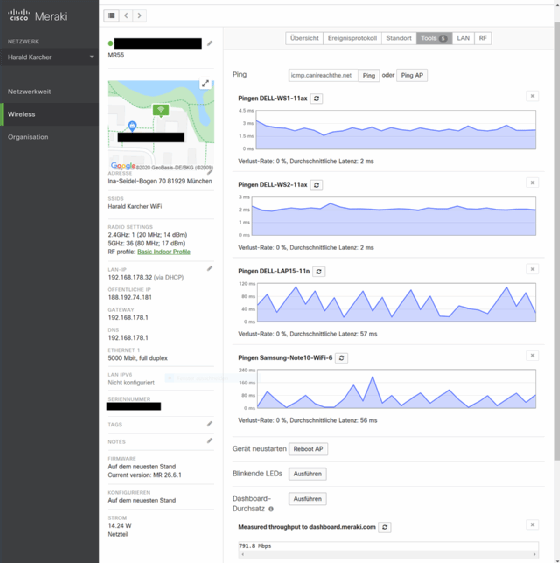
Getty Images/iStockphoto
Cisco customers eager for Meraki's Catalyst management
IT professionals were excited to see cloud-based Meraki management for Catalyst switches but were less enthusiastic over the new Cisco Security Cloud.
Cisco's recent addition of Catalyst campus switches to its cloud-based Meraki network management platform has IT administrators expecting to do more without increasing staffing.
The Meraki update seemed to excite network engineers the most of the several cloud-related announcements that Cisco made at the Cisco Live conference last week. That's likely because Catalyst accounts for more than half of the global campus switching market, although its share has shrunk over the last several years.
Network administrator Jared Houghton looks forward to using Meraki and Catalyst together to ease his workload as the sole engineer at Bonneville International, a Utah media and broadcast company.
"One of my challenges is being able to manage all the equipment [covering Bonneville's] market --management is definitely a big, time-consuming thing," he said. "Simplifying that [job] is a big deal for me."
Luis Morales, CTO of Valley Health System in New Jersey, expects the latest version of Meraki to ease the complexity of moving Valley Health's flagship hospital to a new healthcare campus by next year. Morales hopes to complete The Valley Hospital project without hiring more staff.
"I think Meraki and [its] switch visibility is going to be huge for us," Morales said. "Managing our diverse environment with all the different sites is a challenge. … If we don't have to add more people to manage it, that will be tremendous."

Cisco has added to the Meraki dashboard support for Catalyst 9200, 9300, and 9500 switches. The company plans to expand support to the entire Catalyst 9000 line in time. Also, Cisco will release integration between Meraki and the ThousandEyes internet intelligence platform soon, Todd Nightingale, the senior vice president and general manager of enterprise networking at Cisco, said.
A network engineer who asked to remain anonymous because he wasn't authorized to talk to the media wondered why Cisco didn't add Catalyst to Meraki sooner, given the customer demand.
"I'm just surprised it took them so long to figure that out," he said.
Now that Cisco has gone this far, he wants the company to go further by adding to Meraki more troubleshooting features, such as a greater wealth of switching logs. "Meraki still needs to go a long way, [but] it's getting better," he said.
Cisco launches Nexus Cloud
Cisco's other significant launch was Nexus Cloud, which will eventually incorporate most Nexus Dashboard management features for Nexus data center switches. For now, Nexus Cloud offers onboarding and traffic analysis.
Joseph Imprescia, a senior network engineer at Boston-based insurance company Liberty Mutual, is deploying the on-premises Nexus Dashboard. The software manages network operations across Cisco ACI and NX-OS data center fabrics. ACI, or Application Centric Infrastructure, is the software-defined networking product for private data centers and public clouds; NX-OS is the operating system for Nexus switches.
Imprescia looks forward to using Nexus Cloud when he deploys ACI in public clouds. "We will be using [Nexus Cloud], but that will be for our ACI fabrics as we go more to rolling out multi-cloud," he said.
Frankie Bueno, a systems engineer for Connecticut telecom company Charter Communications, said her company could use Nexus Cloud in the future to correlate analytics from across different network connections.
"To be able to see things at a glance in a way where you can actually see how things are connected -- like hybrid views -- I think are very helpful," Bueno said.
Cisco takes more security to the cloud
Earlier in the month, Cisco introduced Cisco Security Cloud for network security. The unified security management and policy administration platform sits between employees connecting from anywhere and applications running in the cloud or the data center. Security Cloud provides features like risk-based authentication and zero trust.
Some Cisco Live attendees were wary of giving control to a cloud-based security product.
The Brooklyn Hospital Center in New York, which suffered a painful malware attack in 2019, uses Cisco on-premises firewalls, access control systems and other technology to lock down its networks. The hospital is unlikely to use Cisco Security Cloud or any other cloud-based security product that would touch patient data, said Shane Froebel, the center's acting chief information security officer.
"There's a very rigorous checklist that I have before I say, 'Yes, the cloud is OK,'" Froebel said. "[But] I'll never put a firewall, I'll never put a router on the cloud. I think it's too risky."
Froebel's caution comes from working in a highly regulated industry that must answer to multiple government agencies if patient data is compromised. That process would get more complicated if a cloud provider stored or handled patient data.
"We're too regulated," Froebel said.
Luis Melendrez, an information systems specialist for the California utility company Imperial Irrigation District, echoed Froebel's sentiments. He adopted Cisco's next-generation firewalls a few years ago and is impressed with the intelligence it provides. However, putting his network's security in the cloud still makes Melendrez nervous.
"I need to be convinced that it's secure to move [data] to the cloud," he said.
Several network managers weren't considering Security Cloud because of previous evaluations of Cisco security products. Back then, they found the technology poorly integrated, a problem Cisco tries to address with Security Cloud.
While Valley Health System is a Cisco shop for network and telephone infrastructure, it uses Palo Alto for security, Morales said.
"We looked at Cisco solutions [and] at that time, I think it was -- I'm going to say fractured," he said. "Palo Alto provided a more unified approach."
Madelaine Millar is a news writer covering network technology at TechTarget. She has previously written about science and technology for MIT's Lincoln Laboratory and the Khoury College of Computer Sciences, as well as covering community news for Boston Globe Media.






